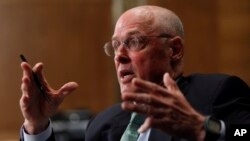Controlling pollution and a stable urbanization plan are two of the biggest issues facing China’s economy, according to former U.S. Treasury Secretary Hank Paulson.
China, with the world’s second-largest economy behind the United States, experienced its slowest rate of growth in six years during the first three months of 2015.
While many nations would enjoy a 7 percent expansion in their economy, that rate currently represents a significant slowdown for China, which had growth at 7.3 percent in the final quarter of 2014.
Many reasons factor into the overall economic numbers. Moving forward, Paulson told VOA that China must pay special attention to a pair of issues: sustainable urbanization, and better air quality with efforts to curb climate change.
Impact the economy
Left unchecked, he said, those issues will further impact China’s economy with significant ramifications for global markets.
Since 1999, Paulson has made numerous trips to China as CEO of Goldman Sachs, Secretary of the Treasury, and now as the founder and chairman of the non-profit Paulson Institute.
In his new book Dealing with China, Paulson is hoping Western readers will better understand the changes in China, which is still evolving dramatically and will likely have an increasingly complicated relationship with the West, and the United States in particular.
“This is a country that is now a formidable competitor in addition to a partner," he said. "It’s very important that we have a strong relationship where we don’t let our differences preclude us from getting some things done where we have common interest and shared interests, because most of the major issues we’re facing in the world today will be easier to solve if the United States and China are working in complementary ways as opposed to cross-purposes.
“For instance, if China has 650 million people in the cities, the next 300 million people, which is the size of the United States, going to the cities will be a big global event in the next 25 years,” Paulson said.
“It will drive not only global economic outcomes, but environmental outcomes and we’ve got no real chance of curbing climate change, which I think is one of the real big economic risks, and risks to the way of life on this planet unless China continues to make progress there," Paulson said.
"They’re committed to making it and I think the U.S. working together with China is a very good device to help make that progress," he added.
Adjust economic model
Paulson said Chinese leaders are very aware they need to adjust an economic model that has worked well but is beginning to run out of steam.
“It’s been too reliant on exports and too reliant on municipal debt which has been growing very, very rapidly, much faster than the economy has been growing. That has funded infrastructure and for a variety of reasons a lot of the bad debts are in trust companies which are part of a shadow banking system,” he added.
Paulson said the source of growth in the future is key for China.
"It’s important that they fix a broken municipal financial system and it’s going to take a new nationwide tax reform and devolving certain responsibilities for budget to the provincial and municipal level and doing certain things better at the central government level,” he said. “The sooner they fix this, the less costly the credit losses will be and the less likelihood that there will be of doing real damage to the underlying economy.”
Investors continue to pour money into China’s stock markets, raising alarms outside of the mainland about overvalued stocks and the risk of major market corrections.
China has made reforms in capital markets but more work is needed, Paulson said.
“One step they’ve taken is creating these linkages between Shanghai and Hong Kong, which has led to a lot of money coming in from Hong Kong, which has led to volatility and inflated the markets there. And I think that’s what the warnings were about,” he said.
Asian investment bank
Concerns raised by the United States about China’s new Asian Infrastructure Investment Bank were largely ignored as 57 nations last week agreed to become founding members.
Paulson pointed to China as the leader in infrastructure funding and financing. He said, “I think my government made a mistake not wanting to join and work for strong standards.
"The World Bank and a number of the other multilateral banks do infrastructure funding. I think we should be focused on how to get them, how to modernize them and have them play a bigger role in infrastructure funding," he said.
“The U.S. should be working to do that and to support China in this effort,” Paulson added.





